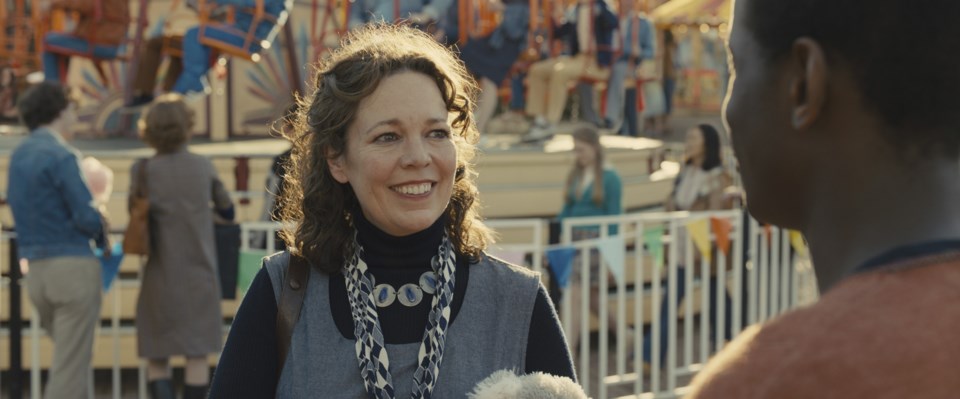Olivia Colman plays the manager of a movie theater in Sam MendesŌĆÖ new film ŌĆ£ .ŌĆØ ItŌĆÖs a cinema palace in a small town on EnglandŌĆÖs south coast that is showing its age. The once grand establishment used to play films on multiple screens on multiple floors. The top floor even had a large ballroom area, a piano, a stately bar and booth-style seating next to large windows looking out onto the sea. Going to the movies here, you imagine, must have been an occasion worth dressing up for. But now itŌĆÖs just gathering dust and providing shelter to the local pigeons.
This is not a movie about people watching movies, however. Not literally at least. There is a wistful monologue about how projection works, from Toby Jones, and another about how the movies can be an escape and, of course, itŌĆÖs all building to something. But movies are mostly just the glamorous backdrop to a dreary workplace. ŌĆ£Empire of LightŌĆØ is instead about a few people who make the movie theaters run, who take the tickets and sweep the popcorn and other disgusting items people leave on the floors and seats.
ColmanŌĆÖs character, Hilary, doesnŌĆÖt even watch the movies herself. Those, she explains with all the passion of a customer service representative working an overnight shift, are for the patrons. ItŌĆÖs unclear if sheŌĆÖs always been this way, or if itŌĆÖs the lithium the doctor has prescribed her to take to regulate her moods, but her life is going through the motions, whether itŌĆÖs setting up the sweets stand or going into the back room with her lecherous, married boss (played, upsettingly well, by Colin Firth).
There is an overwhelming melancholy to the whole endeavor, which is handsomely shot by Roger Deakins and feels like a farewell to something. Mendes, who also wrote the script, was inspired by a pivotal era in his own life. ŌĆ£Empire of LightŌĆØ is set in the early days of Margaret ThatcherŌĆÖs run as Prime Minister, when the culture in the country seemed to be fracturing in some ways, with increased violence and racism juxtaposed with some extraordinary art and music. He was a teenager at the time.
But this isnŌĆÖt ŌĆ£The FabelmansŌĆØ or ŌĆ£Armageddon Time.ŌĆØ Mendes has not made his teenage self the protagonist, but instead a woman in middle age who is suffering from mental health issues, and a magnetic younger Black man, Stephen (an excellent showcase for Michael Ward), who far too smart and vibrant for this provincial town. Hilary and Stephen become friends, then lovers, but, you know, itŌĆÖs complicated and the film is a bit meandering in getting where itŌĆÖs going.
You have to respect Mendes and all of these masters of their craft, from Deakins to composers Trent Reznor and Atticus Ross, for banding together for ŌĆ£Empire of Light,ŌĆØ which, even for the guy who made ŌĆ£Skyfall,ŌĆØ seems like an improbable film to get made: Original, quiet, elegant. But ŌĆ£Empire of LightŌĆØ is also easy to admire but difficult to love. Though Colman is always wonderful, Hilary still feels like a bit of an enigma. IŌĆÖm not even sure what IŌĆÖm supposed to want for her aside from better mental health care, which is probably not going to come in the form of stepping in the cinema, though itŌĆÖs a romantic thought.
ŌĆ£Empire of LightŌĆØ may be a love letter to the movies, but itŌĆÖs a sad one in which one of the parties, the local, independent movie theater, is fading away and possibly already gone.
ŌĆ£Empire of Light,ŌĆØ a Searchlight Pictures release in theaters Friday, is rated R by the Motion Picture Association for ŌĆ£sexual content, language and brief violence.ŌĆØ Running time: 119 minutes. Two and a half stars out of four.
ŌĆö-
MPA definition of R: Restricted. Under 17 requires accompanying parent or adult guardian.
ŌĆö-
Follow AP Film Writer Lindsey Bahr on Twitter: www.twitter.com/ldbahr.
Lindsey Bahr, The Associated Press



